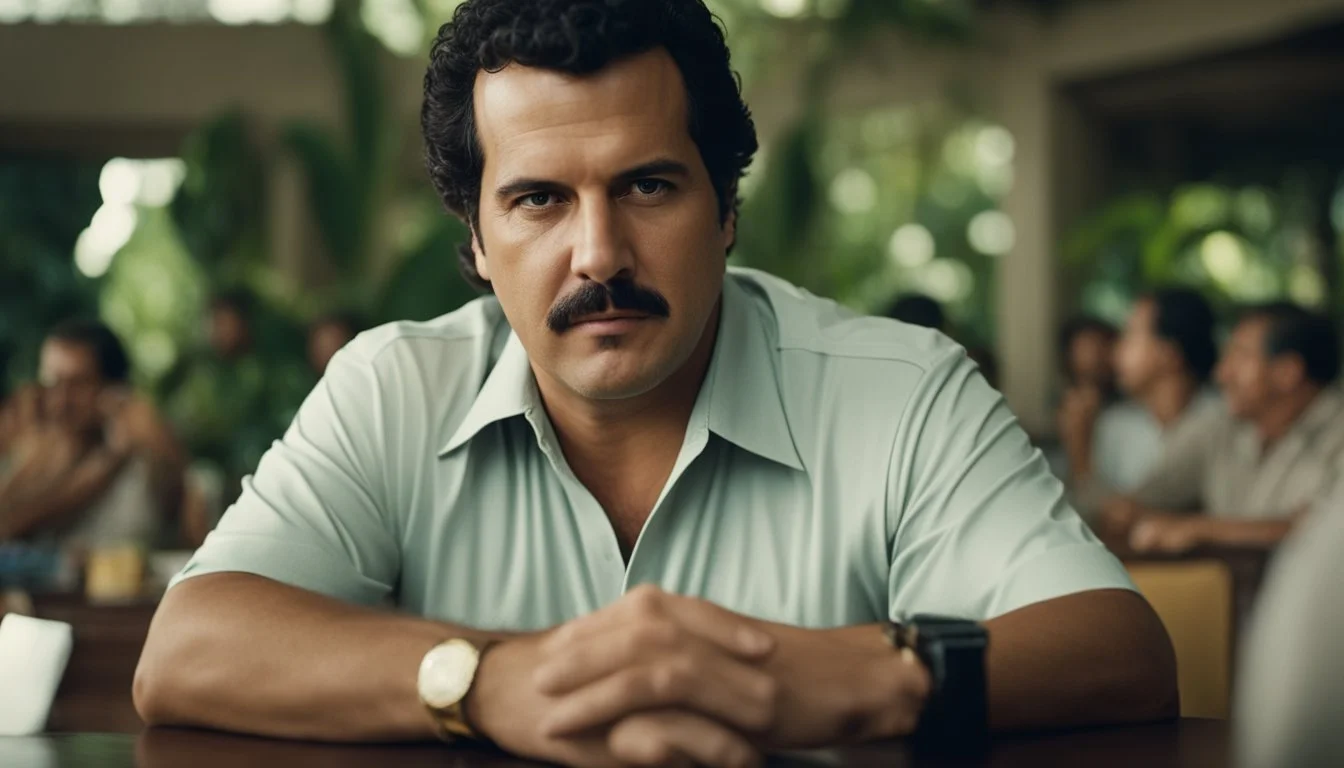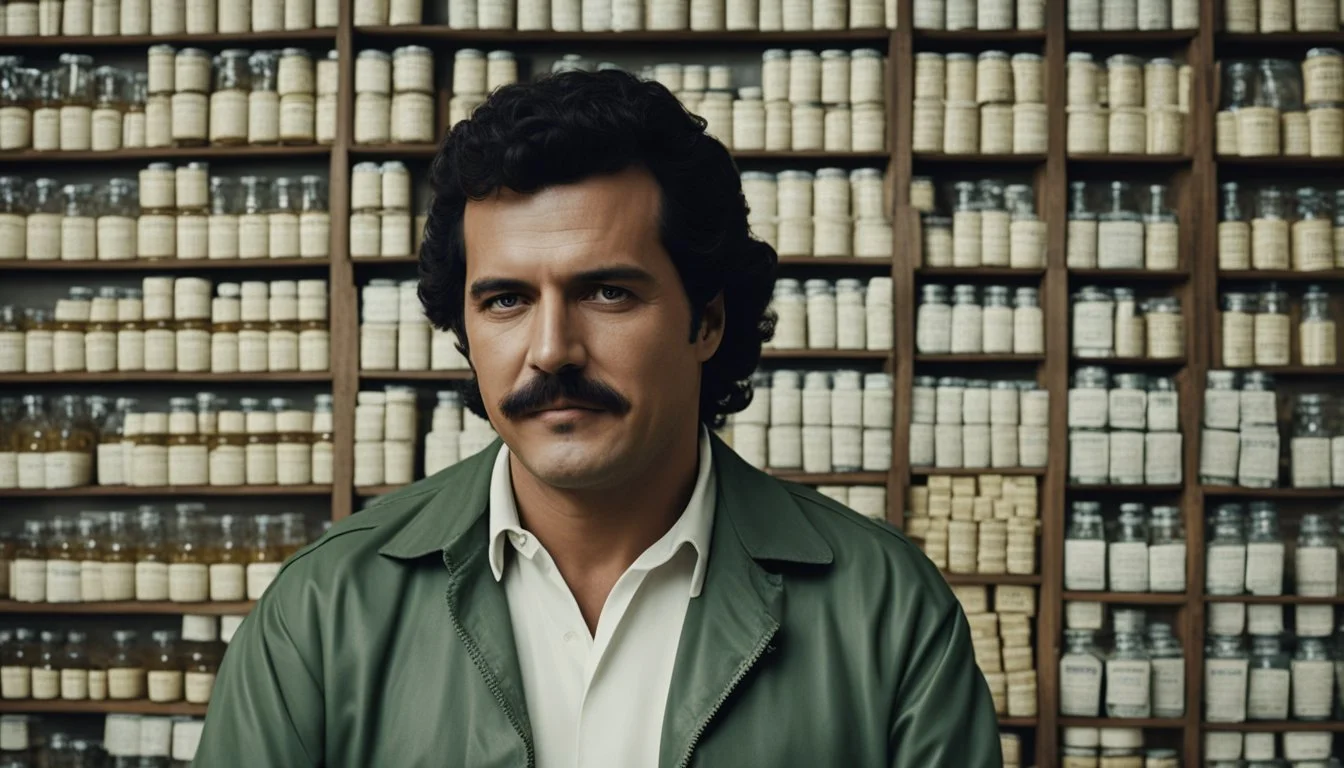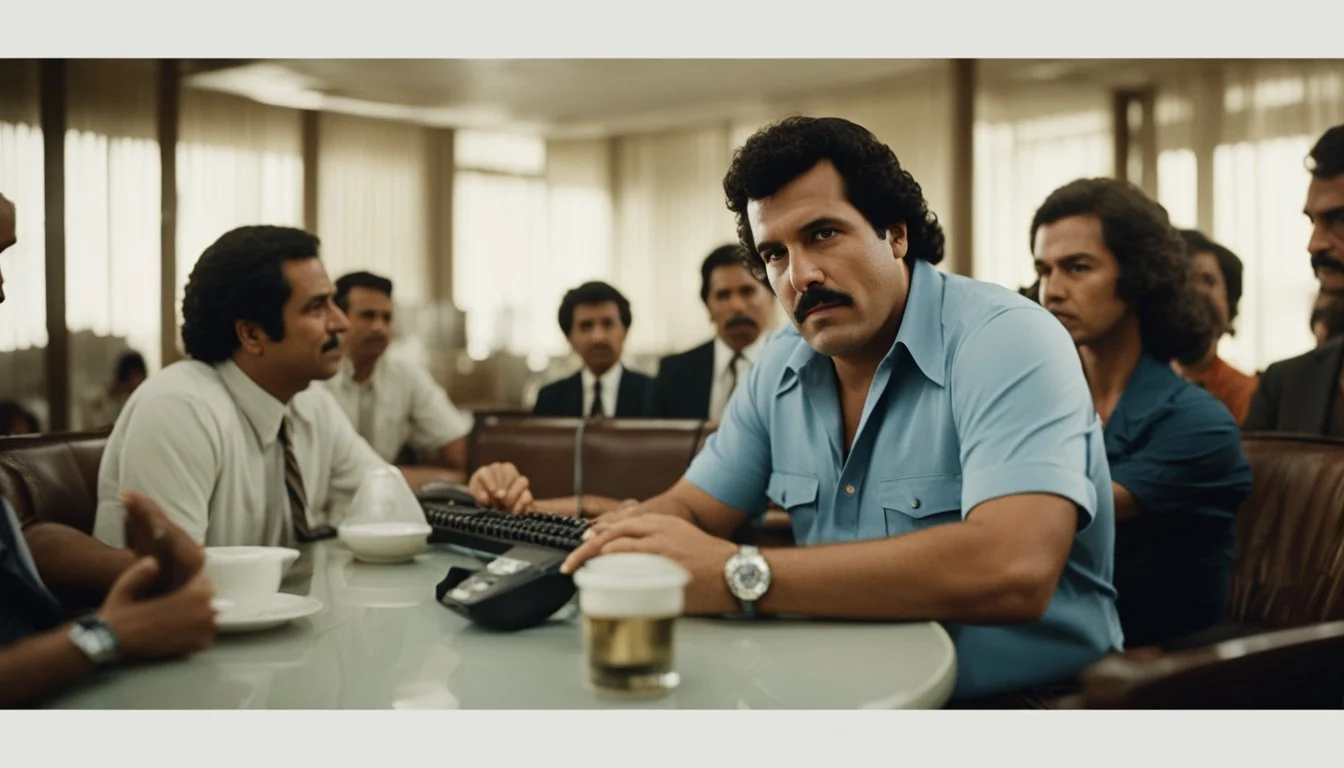These Docs Will Take You Inside the Rise and Fall of Pablo Escobar
Pablo Escobar, a notorious drug lord whose exploits have become the stuff of legend, has been the subject of numerous documentaries over the years. As the leader of the Medellín Cartel, Escobar's bloody reign throughout the 1980s and early 1990s left a lasting impact on the world. Documentaries about this infamous figure delve into various aspects of his life, from his rise to power and the violence that defined his cartel, to the lasting legacy he left behind in his native Colombia and beyond.
These documentaries offer a fascinating insight into the complex world of drug trafficking, political power, and the impact of Escobar's actions on society. Some take a more critical look at the role of governments and law enforcement in combating the drug trade, while others provide an intimate glimpse into the lives of those who were closest to Escobar and the people who sought to bring him down.
Through extensive research and interviews, these documentaries provide a comprehensive understanding of the man who, for a time, was considered one of the most powerful and feared individuals in the world. With the intention to inform and educate, they serve as a sobering reminder of the often brutal realities of the drug trade and its indelible consequences on both the individuals involved and the societies they inhabit.
KILLING PABLO (2001)
Killing Pablo is a 2001 documentary based on the best-selling book by Mark Bowden with the same title. The film provides a comprehensive and captivating look at the life and death of one of the most notorious drug lords in history, Pablo Escobar.
The documentary delves into various aspects of Escobar's life, including his:
Early life and rise to power
The formation and operations of the Medellín Cartel
Escobar's political ambitions and influence
The war against the Colombian government and the United States
The hunt for and killing of Pablo Escobar
The filmmakers managed to conduct interviews with key players and witnesses in the story – from high-ranking Colombian officials, DEA agents, journalists who covered the events, to Escobar's family members. It allowed them to provide a multi-faceted perspective on the events that unfolded.
One of the most noteworthy aspects of Killing Pablo is its presentation of the complex relationship between Colombia, the United States, and Escobar. The film explores:
The drug trade's impact on both nations
The political turmoil that ensued in Colombia
The U.S.'s controversial involvement in the conflict
Some powerful moments in the documentary include:
Footage of the aftermath of violent bombings orchestrated by Escobar
Details of the extrajudicial killings by the vigilante group Los Pepes
The ultimate showdown that led to Escobar's demise
Killing Pablo succeeds in providing a compelling, detailed, and balanced account of the life and death of Pablo Escobar, as well as the broader implications of his actions. The combination of interviews, archival footage, and first-hand accounts enable a captivating and well-rounded narrative that stands out among other documentaries about this notorious figure.
PABLO ESCOBAR: THE TERROR OF COLOMBIA (2002)
This 2002 documentary takes a deep dive into the life of Pablo Escobar, one of history's most infamous drug lords. The film reveals the magnitude of his empire, his ruthlessness, and the effects of his criminal activities on Colombia.
The documentary covers key moments in Escobar's life, such as:
His humble beginnings in the slums of Medellín.
The rise of his drug empire in the late 1970s.
His political ambitions and election as an alternate congressman.
His role in the rampant violence in Colombia during the 1980s.
His eventual downfall and death in 1993.
A notable aspect of the documentary is its focus on interviews with individuals personally connected to Escobar, which are instrumental in shedding light on his complex persona.
Throughout the film, it becomes apparent that Escobar's life was a constant balancing act between power, violence, and family life. He was both adored and feared by Colombians, as some saw him as a Robin Hood figure who gave back to his community, while others experienced firsthand the terror and violence he unleashed.
Utilizing archival footage and photographs, the documentary paints a vivid depiction of the sociopolitical climate of 1980s and early 1990s Colombia. The ultimate impact of Escobar's reign is further elucidated by examining:
The narco-terrorism phenomenon
The Medellín Cartel's gruesome tactics
The government's response to drug cartels
The lingering effects of his empire in modern Colombia
While "Pablo Escobar: The Terror of Colombia" doesn't offer new groundbreaking information, it provides a comprehensive and well-structured glimpse into the life of a notorious figure, giving viewers a clear understanding of both the man and the era in which he ruled.
FINDING ESCOBAR’S MILLIONS (2017)
Finding Escobar's Millions is a captivating documentary series released in 2017. The series follows two former CIA agents, Douglas Laux and Ben Smith, who embark on a mission to uncover the hidden fortune of notorious drug lord, Pablo Escobar. The search takes them on a thrilling journey through Colombia, where they collaborate with local authorities and informants to piece together the puzzle of Escobar's stashed wealth.
Throughout the series, viewers are offered a glimpse into the life and legacy of Pablo Escobar. The kingpin's criminal empire expanded during the 1980s and early 1990s and left behind an estimated fortune of $30 billion at the height of his rule. Here are some highlights of the show:
Episode 1: The former CIA agents arrive in Colombia and begin their search using intel from local sources.
Episode 2: Laux and Smith explore one of Escobar's secret jungle hideaways and discover a hidden underground bunker.
Episode 3: They investigate an elusive accountant who may hold key information about Escobar's treasure.
Episode 4: The team visits a known drug operation site in hopes of discovering hidden cash.
Episode 5: Laux and Smith go undercover to infiltrate the world of drug dealers and gain valuable information.
Throughout the series, several key factors and challenges come into play that make the search for Escobar's hidden fortune both intriguing and difficult:
Colombian Government Interference: The ongoing cooperation and occasional interference from Colombian authorities add a layer of complexity to the investigation.
Decades of Time: With Pablo Escobar's death in 1993, much of the information about his hidden wealth has been lost, and time has taken its toll on physical evidence.
Danger and Suspicion: Threats and tense situations arise as Laux and Smith navigate the dangerous world of Escobar's associates and former rivals.
By blending historical contexts with action-packed discoveries, Finding Escobar's Millions successfully crafts a vivid and engaging narrative for viewers. As the agents continue their quest to unravel the mystery of Pablo Escobar's hidden fortune, audiences remain captivated by the complex web of power and wealth left behind by the infamous drug lord.
THE HUNT FOR ESCOBAR’S HIPPOS (2020)
The Hunt for Escobar's Hippos is a fascinating documentary released in 2020, which dives into the efforts made to control the rapidly growing population of hippos in Colombia—a legacy left behind by the infamous drug lord, Pablo Escobar.
Escobar, known for his extravagance, imported four hippos to his private zoo in the 1980s. After his death, the hippos were left to their own devices and their population exploded. This documentary serves as an eye-opener, highlighting the ecological impact these non-native animals have on the local ecosystem.
The film primarily features two experts in the field:
Dr. David Echeverri López - a Colombian biologist conducting research on the ecological impact of hippos in Colombia.
Jonathan Shurin - an ecologist from the University of California, San Diego, who studies the effects of invasive species on various ecosystems.
Their insights and opinions throughout the documentary shed light on the complexities surrounding the management and containment of these animals.
Throughout the course of the documentary, viewers get a glimpse into the ongoing efforts to monitor and manage the invasive hippos. For example, the film showcases experts and local authorities capturing and sterilizing escaped hippos, highlighting the immense difficulty and controversy of handling these enormous creatures.
The Hunt for Escobar's Hippos manages to expertly present a multifaceted issue, blending historical context with the present-day ecological crisis facing Colombia. It underscores the unusual and challenging legacy left behind by a notorious drug lord and its impact on the environment and local communities.
THE RISE AND FALL OF PABLO ESCOBAR (2018)
The Rise and Fall of Pablo Escobar is a 2018 documentary that chronicles the life of the infamous drug lord, from his beginnings to his ultimate demise. Directed by Juan Diego Escobar Alzate, this documentary takes a balanced approach in telling the story of one of history's most notorious figures.
The film is structured in a chronological order, with each segment focusing on a different aspect of Escobar's life. It begins by depicting the humble beginnings in a small Colombian village, where he evolved from a small-time thief to the mastermind of one of the world's most feared drug cartels. It is important to note that the documentary presents a wide range of witnesses and testimonies, from family members to victims and law enforcement officials.
Some key moments highlighted in the film include:
Escobar's entry into the drug trade
The founding of the Medellin Cartel
The period of maximum power and influence
The war against the Colombian state
The formation of Los Pepes and their struggle against the cartel
Escobar's arrest and escape from La Catedral
The hunt for Escobar and eventual death
Statistics and data are presented throughout the film, providing context for the viewer and illustrating the scale of the operation.
From a narrative standpoint, the documentary makes use of a mix of interviews, archival footage, and photographs. The interviews offer firsthand insight into Escobar's life, allowing the viewer to understand his motivations and actions over time. Additionally, archival footage helps to paint a vivid picture of the time and place in which these events occurred.
As for the film's tone, it adheres to a neutral and fact-based presentation. While it is not shy about portraying the violence and ruthlessness of the cartel and its leader, it also makes an effort to humanize Escobar and present a more complete picture of the man behind the myth.
In conclusion, The Rise and Fall of Pablo Escobar is a thorough and engaging examination of the notorious drug lord's life. By presenting various perspectives and maintaining a neutral tone, the documentary offers a comprehensive look at the events that shaped Escobar's story.
THE PRIVATE ARCHIVES OF PABLO ESCOBAR (2017)
https://www.youtube.com/watch?v=pdVUATC_NJk&embed=true
The Private Archives of Pablo Escobar (2017) is a documentary film that has managed to capture the lesser-known side of the notorious drug lord. The film is based on materials gathered by Nicolás Entel, the director, who befriended the Escobar family and gained access to their personal collection of photos, videos, and letters.
The documentary includes:
Interviews: with key figures from Escobar's life, such as his son, Juan Pablo Escobar, and his brother, Roberto Escobar
Photos: Rare, never-before-seen images that showcase the extravagant lifestyle of the drug lord and his family
Letters: Personal correspondences written by Pablo himself, providing insight into his thoughts and motivations
Focus of the Documentary
Two primary themes in The Private Archives of Pablo Escobar are:
The Human Side: The film goes beyond the criminal facade of Escobar, revealing a more intimate view into his personal life, relationships, and emotions
The Dark Side: Despite the focus on his human qualities, the documentary also delves into the brutal world of the Medellín Cartel and its victims, effectively contrasting the conflicting aspects of his character
Reception
Critics have praised this documentary for its unique perspective and wealth of information. They describe it as:
Informative: The abundance of exclusive material offers an unparalleled look into the life of Escobar
Balanced: By portraying both the human and dark sides of his character, the film provides a nuanced and authentic representation of his life
Emotionally Engaging: The personal stories and insights shared by the Escobar family members creates an emotional connection between the viewer and the film's subjects
In summary, The Private Archives of Pablo Escobar (2017) is a compelling, informative, and emotionally engaging documentary that provides viewers with a unique look into the personal life of one of history's most infamous criminals.
Conclusion
In recent years, documentaries about Pablo Escobar have captivated audiences worldwide, providing various perspectives on the life and actions of the infamous Colombian drug lord. These documentaries explore different facets of Escobar's life and legacy, from his rise to power and criminal activities to his personal life and death.
These documentaries allow viewers to gain a deeper understanding of the complexities surrounding Escobar's life and the far-reaching consequences of his actions. Although the documentaries may differ in tone and interview subjects, they all contribute to creating a well-rounded portrait of one of history's most notorious criminals. Through engaging storytelling and attention to detail, these documentaries serve as valuable resources for those seeking to learn more about Pablo Escobar and the world he inhabited.
#watch documentary pablo escobar #pablo escobar el #del mal sign #narcos video #cocaine #kill #prison #netflix #hunted




